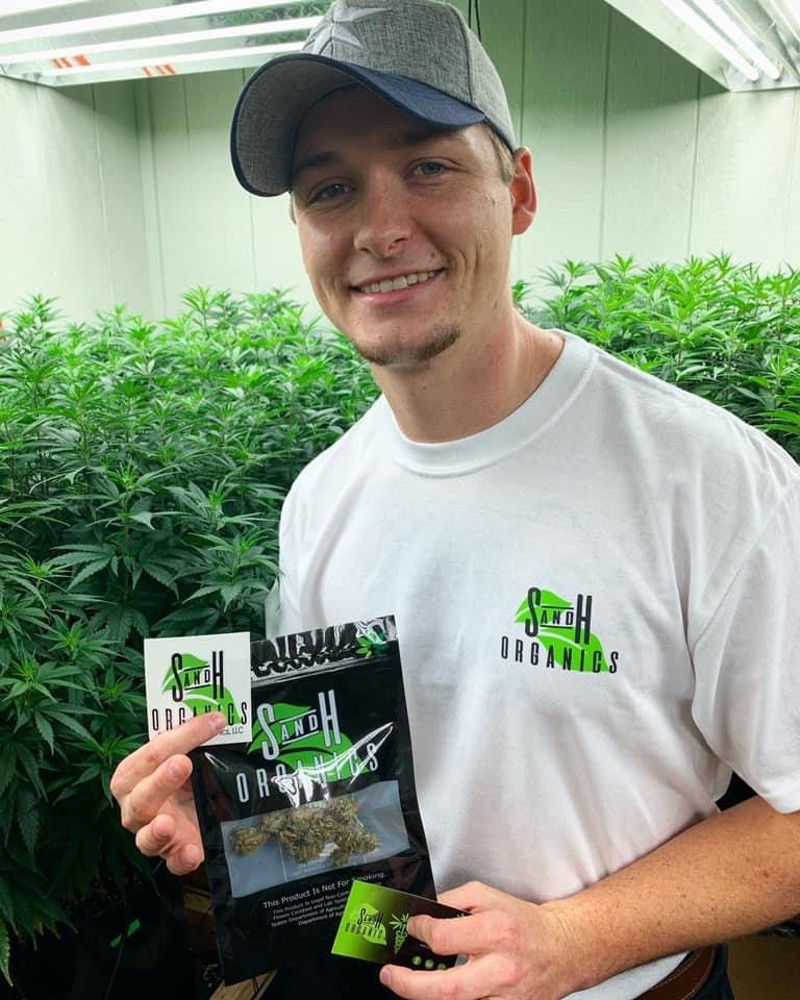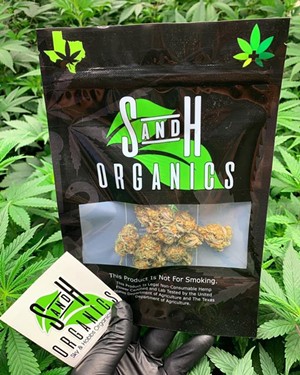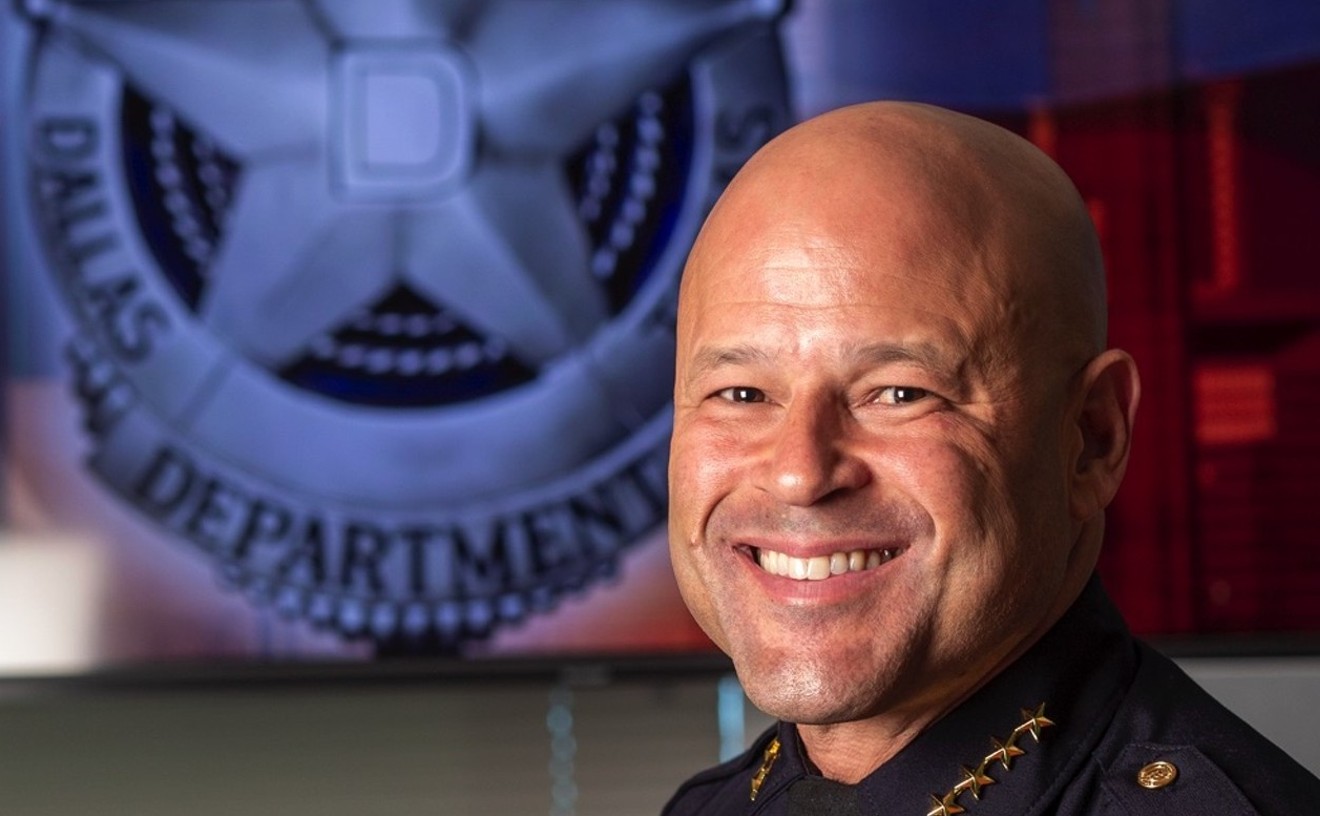But Robinson said he didn’t possess any marijuana. What he had was hemp, lawfully grown under a license from the Texas Department of Agriculture.
He started to cry as he described the situation to the Observer. “It’s so fucked up, man,” the 27-year-old Navy vet said. “Horrible time. I have arthritis. I have PTSD. I have a lot of problems, so it was very uncomfortable to say the very least.”
Before the raid by the sheriff’s office, which refused to discuss the case, Robinson and his long-time friend and business partner, 28-year-old Skyler Purcell, were running a successful hemp business.
Robinson’s nickname is Hobbs. Purcell often goes by Sky, so they named their business Sky & Hobbs Organics. Their plan was to grow and sell a version of the cannabis plant that’s low in delta-9 THC, the chemical found in cannabis that gets users high.
In 2019, the Texas Legislature passed a law leading to the creation of the Texas Industrial Hemp Program, a licensing scheme that would allow growers to plant a cash crop that supporters saw as a boon for the Texas farmers. Hemp fibers are used to make textiles and rope. The plant’s seeds are pressed to make oil used in the industry and in food supplements.
“This also includes products for consumable hemp products which contain cannabidiol (CBD), as well as other edible parts of the hemp plant,” the TDA’s website for the program states.
The market for CBD products is booming, thanks to its reported health benefits, so Robinson and Purcell rented a facility and turned it into an indoor farm. They shared photos on social media as they got the operation running. Rows of green, fully matured and maturing hemp plants filled several rooms. When it was ready to harvest, they’d stuff pounds of hemp into vacuum-sealed bags for bulk orders. Smaller quantities were packaged for individual sale.
They ended up putting between $75,000-$100,000 into the business and received a state license in 2020. They said everyone in the community knew what they were doing.
None of that mattered. When the Navarro County Sheriff’s Office was done with them, their plants were cut to the stem and their bags of bud were gone, along with their business.
**

Skyler Purcell had all the correct licensing for his hemp business, but police still harrassed the company and seized product.
Nathan Hunsinger
Robinson and Purcell grew up together. “We’re basically best friends,” Robinson said.
They planned on going to the same college after graduating from high school, but Robinson decided instead to join the Navy.
“I did five years,” Robinson said. “We kept in contact throughout that time period because we’re friends and that’s what friends do.”
He left the Navy with PTSD, anxiety, degenerative disk arthritis from the top of his neck to the bottom of his spine and chronic migraines that he’s been dealing with for about six years. “It’s been terrible. Lots of pain,” he said.
Robinson mentioned his ailments to his friend, and Purcell suggested he try CBD.
“I tried some CBD, and within an instant my neck pains, which associates to my migraines, were completely gone. My back pain was completely gone,” Robinson recalled. “I didn’t feel high. I didn’t feel any type of euphoric effect. My body, mind and everything just felt finally in a place where I can relax. I ended up going to sleep about an hour later. I had probably the best sleep I’ve had in five years at that time.”
He woke up the next day in just as much discomfort as ever. So he tried it again. Again, his pain subsided, and he uses CBD to this day.
He was intrigued and started researching the new industry that blossomed after Congress ended the federal ban on cultivating hemp. That’s when he called Don.
“I said, ‘Sky, the green rush is here,’” Robinson recalled.
In 2018, the U.S. Farm Bill legalized the cultivation of cannabis containing no more than 0.3% delta-9 THC by dry weight. The bill allowed states to set up their own regulatory schemes for hemp growers, and Texas jumped in.
Robinson and Purcell spent two years researching the laws and the market. The plan was to stay in good standing with federal and state authorities so if high-THC cannabis was ever legalized, Sky & Hobbs Organics could be one of the first companies certified to grow and sell it.
“This right here is the medicine that we believe is going to be the future of medicine,” Robinson said.“I said, ‘Sky, the green rush is here.'" – Hunter Robinson, Sky & Hobbs Organics
tweet this
As they were setting up their business, they ran into a few law enforcement officers and struck up conversations about the hemp industry and their plans. Robinson said he offered to have them come by their facility and guide them through the new laws if they needed help.
“We offered our hand to these people,” he said. “Keep in mind, you’re talking to a gentleman who had a [thin] blue line flag on his truck. That’s me. I absolutely support my law enforcement, and I was more than willing to help in any way possible.”
Getting the business started, they were working 20-hour days on top of their day jobs, but things went smoothly once they were operating. “We were just flying,” Robinson said. “We were out there.”
They were even planning to move into a bigger facility. “We had a line at the door basically,” Robinson said. They estimate they were on their way to becoming a multimillion dollar hemp company. Then, they were raided, for the first time, on June 10, 2021.
Officers with the Navarro County Sheriff’s Office arrived with a search warrant issued that morning by Navarro County District Judge James E. Lagomarsino.
The only details mentioned in the warrant was a description of the building, the business address and a weed smell reported by neighbors. An affidavit supporting the warrant references their equipment as being used for “marijuana growing.”
Clint Andrews, a deputy with the Navarro County Sheriff’s Department assigned to the Narcotics Division, was one of the officers taking part in the raid.
Andrews conducted surveillance on the business the day before the raid, according to the affidavit, after the sheriff’s office allegedly received a tip about the property.
He, as well as Captain Stan Farmer and Corporal Shane Richards went back on the 10th. Reached for comment, Farmer said he couldn’t discuss the case.
“On 6-10-21 Lieutenant Andrews, Captain Farmer and Corporal Richards went back to the location and on the west side where the plastic pots are located observed what is believed to be pots containing marijuana stems and other plant materials used in a growing operation,” the affidavit said. “Lieutenant Andrews could also smell what he knew to be marijuana emitting from the vents coming out of the building.”
Perhaps Andrews hadn’t heard of hemp, which looks and smells just like high-THC cannabis. They’re so identical, many district attorneys won’t prosecute for marijuana possession unless the plant is tested and proven to contain illegal amounts of THC. These complications and the costs of the tests have led some municipalities to relax marijuana enforcement, but there was nothing relaxed about Sky & Hobbs Organics’ interactions with the Navarro County Sheriff’s Office.
During the first raid, the cops seized some of their products. Purcell and Robinson said they’re not sure how much was taken during the first raid, but no one was arrested or charged at the scene after providing legal paperwork. Their legal troubles didn’t end there though.
“This isn’t a case where they came in looking to hand out a possession charge,” Purcell said of the raid. “They came in because they thought, ‘Oh, there’s distribution, there’s manufacturing and there’s trafficking going on from this establishment.’ Since they came in with that mindset, we were treated as such. We were treated as criminals, not as a TDA-licensed facility. It’s nuts that this turned into a felony possession case on an individual when this is a licensed business.
“Had they just called us, we would’ve let them in. We wanted to educate … everyone, including law enforcement.”
The first affidavit says police knocked, but didn’t get an answer. That’s when they busted in. Officers at the scene told them they had no knowledge of the state’s hemp program, Robinson and Purcell said.
“Dude, I’m a disabled and decorated veteran,” Robinson said. “It is their job to ensure that you can still be an American in this country.”
Perhaps the Navarro County officers truly hadn’t heard of the state’s widely publicized hemp program and, despite being law enforcement officers, are not up to speed on the laws they’re paid to enforce. A spokesperson with the agriculture department told the Observer that when the hemp program was approved, there was little to no funding allocated for outreach. Most of law enforcement’s knowledge of the program has come from one-on-one interactions when they’ve reached out to the TDA, the spokesperson said.
“The problem that I have is that I had all these beliefs in my country, in my nation and the American dream, and I assumed these people would be there to support me if I did what was right,” Robinson said. “Instead, they took the route of ‘We don’t care. We’re not going to educate ourselves.’”"We were treated as criminals, not as a TDA-licensed facility." – Skyler Don, Sky & Hobbs Organics
tweet this
He said they had their licenses posted around their building in case law enforcement wanted to check them out.
Robinson recorded his interactions with law enforcement during the first raid and posted the videos on YouTube. Farmer at one point asks why Robinson is filming. Robinson starts to say that a lot of harassment takes place between law enforcement and people in the hemp industry. Farmer got combative after Robinson brought up harassment. “I want to be perfectly clear real quick,” Farmer says. “That’s a big, strong word to use. … Don’t say that word in front of me.”
At one point, Farmer says, “You come at us wrong, we come at you wrong, how about that?”
Arguably, that sounds exactly like harassment and a threat to punish Robinson for speech, which like licensed hemp growing is protected by law, at least in parts of the United States outside Navarro County.
The hemp licenses posted at the facility were slightly out of date, but Robinson was able to show officers a current license when he arrived. He said they just hadn’t gotten around to printing out their most recent license.
Purcell said once the police found out the hemp license was real, they still didn’t contact the TDA, although the TDA has an administrative report that the police are supposed to file. “Everything that the police were filing should have been filed with the TDA, and still to this day the TDA hasn’t been contacted,” Purcell said. “There’s a reason for that.”
Robinson and Purcell said all of their plants came from state certified seeds. They even chose strains that didn’t look as good but more reliably tested under the legal limit. They also avoided the market for THC isomers, which are chemical variants of delta-9 THC that some growers argue the law allows. That area of the law was too gray for Sky & Hobbs’ comfort.
Purcell said every time the TDA tested their hemp, they passed. The Texas Department of State Health Services tested the products from that hemp, looking specifically for delta-9, and they would pass those as well.
But during the first raid, cops would take two CBD varieties and one CBG variety. They said the samples would be sent to a Department of Public Safety lab, which seemed promising to Robinson and Don. Instead, the county eventually decided to send it to a private lab. Farmer said he would keep them updated.
Their business remained an active crime scene, and they were told they weren’t allowed inside.
“They held our property hostage where we couldn’t do business, we couldn’t get out of there,” Robinson said. “It was an active crime scene. My lawyer said ‘If you touch anything in there it could be considered tampering with evidence.’”
A little over two months went by before the cops raided the place again on Aug. 25. The warrant was issued the same morning by the same judge who issued the first one.
It specifically called for the arrest of Robinson. “On or about the 25th day of August the suspect Hunter Robinson and persons unknown to the affiant did then and there knowingly and intentionally possess a usable quantity of marijuana against the peace and dignity of the state,” the warrant read.
Even though Robinson and Purcell said the police took three samples to test during the first raid, the second arrest warrant only mentions two test results. It says the two came back over the legal limit. One had 0.378% delta-9 THC and the other had 0.468%, according to the sheriff’s office. “Both above named exhibits are above the .3% concentration and will be Marijuana,” the warrant says.
This is what sparked the second raid.
Robinson and Purcell weren’t there at the time. Robinson found out about the raid and showed up the next day. That’s when he saw a second search, seizure and arrest warrant posted on their door. He also noticed the cops had taken the product that was left in the building.
They’re not sure what was taken during which raid, but an inventory list left by the officers in August said they’d seized 11 black and yellow tote bags and two black drums containing “marijuana.” It also says they seized “records and paperwork.”
The building still had plenty of equipment inside, and they still weren’t allowed to enter. Their landlord was told by Farmer that he was free to go inside and get rid of whatever was left. (Emails confirm this.) Meanwhile, Purcell and Robinson were still being told they couldn’t enter the building.
The second warrant didn’t have the affidavit attached. When Robinson tracked it down, it clearly ordered his arrest and referred to all of their hemp as “marijuana.” Even though it ordered his arrest, weeks went by when nothing happened, and the sheriff’s office wasn’t responding to their attorney.“You come at us wrong, we come at you wrong, how about that?” – Stan Farmer, Navarro County Sheriff's Office
tweet this
They told their landlord to go ahead and file for an eviction. At the same time, they’d file a complaint, hoping they could reach an agreement in court and a judge could give them permission to get their possessions out of the building. When a constable stopped by to give them their eviction notice and they explained their situation, however, he told them he couldn’t go through with the eviction if the property was under investigation. The constable said he would give the district attorney overseeing the case a call. He was told the DA didn’t have any knowledge of seized property from their business. The constable was told to give the sheriff’s office a call. When he did, they said the investigation was done and that the eviction could proceed.
Robinson called the sheriff’s office to see what was going on and make sure the investigation was closed. They said it was complete and that they wanted to talk to him in person. “I called Sky and I said ‘Sky, I’m going to jail tomorrow. I just want you to be there.’ I knew what they were doing,” Robinson said.
When he showed up the next day, they took him into a room, said his product tested over the limit and that he was under arrest for felony possession of between 4 ounces and 5 pounds of marijuana. Robinson was surprised by the charge, but mostly because he and Purcell claim the cops took much more than 5 pounds. They said more than 24 pounds of hemp was taken from their business between the two raids.
While the county claims samples tested above the 0.3% threshold, the law includes a “safe harbor” provision to allow for natural variations in THC levels. If a grower uses “reasonable production practices” and the product contains less than 1% THC, it can’t be harvested and must be thrown away. If the product is properly grown and comes in at more than 1%, the TDA can cite a grower for negligence. A grower who produces a crop with 1% THC or greater can face criminal penalties if the state can prove the grower did it deliberately with a “culpable mental state greater than negligence.”
A judge set Robinson’s bond at $2,500, an amount so low Robinson’s bondsman had to verify the amount because they didn’t believe it could be accurate such a charge.
“She said that it seems like someone’s on my side,” Robinson recalled. “I said ‘Well, I’m grateful for a low bond amount, but it doesn’t seem like anyone’s on my side.’”
He was arraigned. After communicating with the prosecuting attorney, things seemed promising for Robinson, but there’s been a communication breakdown since then.
“They’re just playing this game,” Robinson said. “Every piece of documentation that was supposed to protect us, they ignored.”
It’s not the first time something like this has happened, but it doesn’t always end with people having to shutter their businesses.
In February 2020, Richardson police took all the product inside a retail hemp business called The Farm Hause. Kirk Edmondson, owner of the shop at the time, said all his product was third-party tested and had lab reports to prove it was all under the legal THC limit. That didn’t deter the police.
“When the cops came, they ended up seizing all my product,” Edmondson told the Observer last May. “I got it back the same day after showing all my [test results], but it was frustrating. They were uneducated. They thought we were selling weed.”
Sky & Hobbs Organics wasn’t so lucky.

Navarro county police raided Sky & Hobbs Organics and seized inventory.
courtesy of Sky & Hobbs Organics
Farmer and Andrews have been conducting drug busts in Navarro County for some time now. In 2006, they tagged along with Sheriff Elmer Tanner, a captain with the department at the time, to execute a search and arrest warrant tied to a narcotics investigation. Farmer received a tip that two people had a “quantity of illegal drugs” at a house on Cherry Street in Corsicana, according to court documents. He enlisted the help of Tanner, who conducted surveillance on the house and handpicked seven other officers to help execute the warrant. One of them was Andrews.
They raided the wrong house, and the homeowners sued Tanner and the county. One of the homeowners, Randy Whitener, claimed Andrews injured Whitener’s back during the raid. Whitener also claimed Andrews placed a gun to his temple. Whitener’s wife, Mary, claimed Tanner pointed his gun directly at her. He denied that in court.
After realizing their mistake, officers released the Whiteners. For good measure, Farmer asked if Randy had any marijuana in the house. He said he did, so Farmer seized it.
The Whiteners sued Tanner for excessive force and illegal search and seizure. They also sued the county, claiming it didn’t properly train its officers. A judge denied the claims against the county and the claims of excessive force against Tanner. But a judge sided with the Whiteners in their claims of illegal search and seizure against Tanner.
Meanwhile, Robinson said they’ve spoken to the TDA about their case, but the agency didn’t have much advice. “Basically what they tell me is when you’re in a situation like this, the only way you can ensure the right thing gets done is if you create attention,” he explained, “which has been the thing I feared the most because of my career.”
Robinson is a mechanical engineer and didn’t want to get judged at work for being in the hemp industry and in trouble with the law.
But, he said, if he gets a felony offense on his record, that may be the end of his career anyway. That’s why he’s trying to call attention to his case now. “I did nothing wrong,” he said. “That’s just not fair. It’s not fair for my kids. It’s not fair for my family.”
The investigation was closed after Robinson was arrested. When he went inside the building after his release, Robinson recalled, the place was in disarray. It looked like the second raid was quick, as remnants of the seized “marijuana” were scattered all over the floor. Robinson said what they left behind was enough to fill two trash bags.
The TDA apparently never received notice from Navarro County, so the agency said it wouldn’t get involved.
“It’s no different than George Floyd,” Robinson said. “It’s no different than any of these cases where police injustice is taking place. They don’t do what’s right whenever they’ve done what’s wrong, unless they’re forced to.”
The situation has flipped his world upside down, Robinson said.
“Their war on drugs with marijuana is putting my entire life and everything I’ve ever worked for in complete jeopardy, and it’s a shame,” Robinson said. “I have lost all faith in this country. This entire event has changed who I am. It’s changed my outlook on everything. It’s changed my personality. It’s changed everything about me. I’m a different person because of it, and I’m not too happy about it.”
For the foreseeable future, Sky and Hobbs are out of the hemp business.
“I don’t think I’ll ever participate in anything like this again,” Robinson said.
“Unless the state of Texas comes out and fixes the problems they have caused and makes sure hemp farmers, hemp producers, people that are manufacturing products for this industry are protected and guaranteed to be protected, there’s no way I could even come close to considering that,” he said. “All I want at this point is to know first and foremost that I’m not a felon. Secondly, I want to just be able to excel in my career like I was before I started. And if and how it ever happens, I’d like them to make right what they did wrong. I just don’t know if that’s ever going to happen.”
The TDA didn’t respond to the Observer’s specific questions about what it does to inform law enforcement about the hemp program and what it can do for certified hemp businesses that find themselves in situations like Sky & Hobbs’. It’s apparently not too uncommon, according to the president of Texas Hemp Growers, an industry association.
Zachary Maxwell, president of the association, said Robinson and Purcell reached out about their case a few months ago.“I did nothing wrong." – Hunter Robinson, Sky & Hobbs Organics
tweet this
“If what has been reported is true, then his scenario is tragic and frustrating and should light a fire under every hemp farmer in Texas and most certainly Texas Department of Agriculture,” Maxwell said. “Mr. Robinson's scenario is definitely on the extreme end, but he is not alone.”
Maxwell said a few members of Texas Hemp Growers have been raided by police departments across the state. “Even in my own operation, we received an unfriendly visit by the Montgomery County Sheriff’s Office drug task force,” he said via email. “Armored and outfitted for a raid, their plans (and egos) quickly deflated when we produced all the relevant documentation.”
There’s been a breakdown in communication between the TDA, DPS and local law enforcement, he said. To Maxwell, there also seems to be a level of willful ignorance to the new laws, and the Navarro County Sheriff’s Office is a prime example.
“Mr. Robinson should sue Sheriff Tanner and the Navarro County Sheriff’s Office to the maximum extent for damages,” Maxwell said. “A price must be paid by law enforcement offices that willfully ignore state law and inflict terror on innocent Texans. Ignorance of the law is never a valid excuse for criminals, nor should it be an excuse for out-of-touch sheriffs.”
Robinson said: “I just have fear for every person participating in this program because they don’t know. You don’t know this kind of stuff can happen until it happens to you. And this is the kind of stuff that happens that creates new law because this is just absurd.”
And what about Robinson's thin blue line sticker? “I ripped that sucker off and threw it in the trash," he said.
Today, Purcell is an office manager for a pediatric therapy clinic that serves children for special needs. Robinson has since relocated to be closer to his wife’s family in case anything happens to him. His legal troubles have also made him feel as if he'll never get back to financial stability.
“I have a good career, but all the money that I save, it immediately goes into my savings and my lawyer collects it,” he said. “I have no other options. I have no money. I took a lesser paying job and moved to a more expensive place to live because my wife’s family is here and if anything happens they’re here to take care of my wife and kids.
“It’s just a shame, man, the fact that I tried to do something good and it turns into the worst thing ever. That’s not what this country is. It’s not what it’s supposed to be. If anybody is participating and allowing it to be that way, they don’t deserve to be here. They definitely don’t deserve to wear a badge.”














